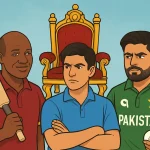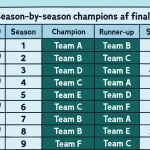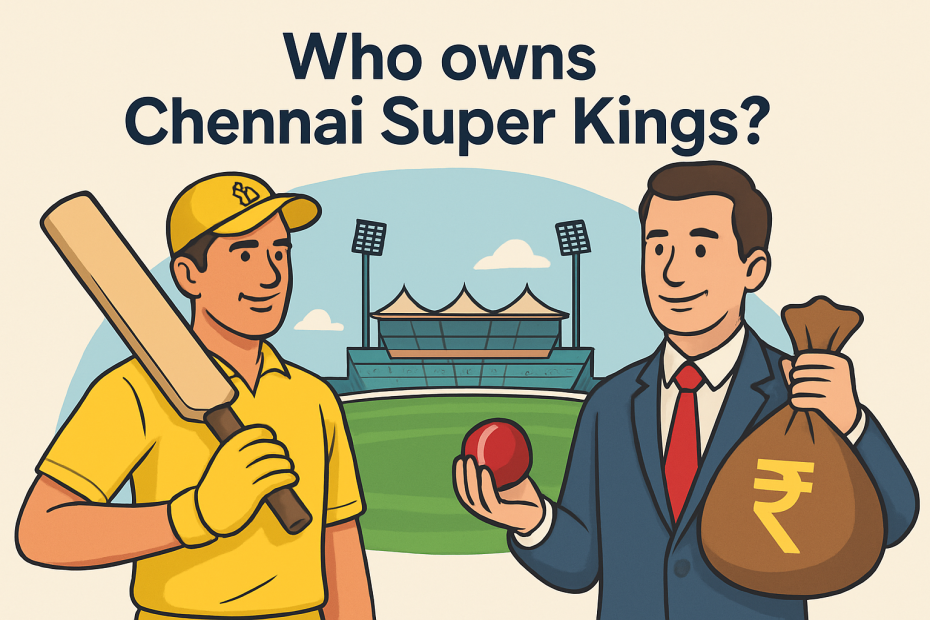Quick answer:
Chennai Super Kings is owned by Chennai Super Kings Cricket Limited (CSKCL), a cricket company promoted by the India Cements group led by industrialist N. Srinivasan. That’s why you’ll often hear two versions of the same truth: the franchise is run by CSKCL, and the face most people associate with the CSK owner is N. Srinivasan.
The clarity you actually came for lives at the intersection of person, company, and entity. It isn’t one thing; it’s a stack. Understanding that stack—how India Cements won the original rights, how the franchise was moved into CSKCL, how the club survived suspension, and how the current management operates—will help you see why the “owner of CSK team” question keeps returning every season.
Why the “CSK owner” answer confuses fans
A single number, a single name—fans crave simplicity. But IPL ownership is corporate. In cricket pubs and on social media, you hear “Srinivasan owns CSK.” Legally, the owner is a company: Chennai Super Kings Cricket Limited. Corporate parents and promoter groups sit above it. The brand below it—Whistle Podu—sits in the hearts of millions. The trick is to connect the dots.
The layers go like this:
- Person: N. Srinivasan, the best-known public face connected to the franchise.
- Company: India Cements, the industrial group that initially won the franchise rights and later spun off the team into a separate company.
- Entity: Chennai Super Kings Cricket Limited (CSKCL), which holds the IPL franchise rights and runs the cricket operations, academies, and sister teams.
The fan hears “CSK owner name” and wants one line. The journalist in me hears “csk ownership structure” and wants to draw a diagram. So let’s do that.
Ownership structure in one glance
- Individual influence: N. Srinivasan (industrialist; promoter of India Cements; long-time cricket administrator).
- Corporate promoter: India Cements group (cement manufacturing conglomerate; promoter group holds influence in CSKCL).
- Franchise-holding company: Chennai Super Kings Cricket Limited (CSKCL) (the legal owner of the Chennai Super Kings IPL franchise; also oversees the Super Kings brand across other leagues and academies).
Two other names often pop up:
- Rupa Gurunath: Business leader, part of the promoter family associated with India Cements. Frequently appears in governance conversations.
- Kasi Viswanathan: CSK CEO. When fans search “csk ceo name,” this is the man behind the unshowy, disciplined ops machine.
About N. Srinivasan and India Cements
To grasp CSK’s origin story, you need to understand the industrialist at the center and the company that placed the initial bet on franchise cricket.
N. Srinivasan, the persona connected to “csk owner”
He’s the figure TV cameras cut to at Chepauk when the game hinges on a cliff. He built a business reputation in cement, became a major presence in Indian cricket administration, and bet early on the IPL model. His style is stoic, sometimes imperious, but built on a simple, repeated mantra you’ll hear from anyone who has sat in on CSK’s internal review meetings: stick to process, not mood.
The public tends to assign him the title “real owner of CSK” because:
- He led the promoter group that first acquired the franchise rights through India Cements.
- He chaired and influenced the move to create a separate company, Chennai Super Kings Cricket Limited.
- He remains a visible decision-maker, especially during auctions and roster calls.
- Media routinely seek his quotes after major events—auctions, mega trades, captaincy changes. When a camera wants “the CSK owner statement,” it’s his voice.
India Cements and the move to CSKCL
India Cements is a listed cement company. It originally held the CSK franchise rights. Later, the franchise was carved out into CSKCL, a separate cricket company. The demerger had two aims:
- Separate the cyclical cement business from the franchise and sports business so each could be valued on its own merits.
- Ringfence cricket operations with dedicated governance and brand-building.
That move gives us today’s neatly defined answer: the “CSK owner” is CSKCL. But you still see the India Cements link because promoter groups and directors often overlap. Many India Cements shareholders became CSKCL shareholders at the separation, and the promoter group associated with India Cements is prominent within CSKCL’s shareholding as well.
Chennai Super Kings Cricket Limited: structure, timeline, and what actually changed
If you’re trying to picture the journey, think of four chapters.
- The bid and birth: A corporate group—India Cements—wins the CSK franchise rights in the inaugural IPL cycle. The brand is built deliberately: yellow, whistle, “process” over panic. From day one, the club’s playbook is clear—backs core players deeply, has a low churn policy, and values “game intelligence” as much as raw power.
- The demerger: The franchise is moved into a new company, Chennai Super Kings Cricket Limited. This is where the legal “owner” changes, though the promoter influence remains recognizable. Shareholders of India Cements receive shares in CSKCL; a separate board forms around the cricket business.
- The storm and suspension: A betting and conflict-of-interest scandal engulfed the league, dragging CSK into the crosswinds. Gurunath Meiyappan, associated with the team, was found guilty of betting-related offenses. The consequence for the club was severe—a suspension from the league for two seasons. The Sun rose again because the foundation was sound. No fire sale, no panicked dismantling. CSK’s management mothballed with purpose and returned with the same core muscle memory: defend home, squeeze the middle overs, finish with ice-cold calm.
- The modern era: CSKCL evolves into a multi-league sports company. It runs academies, supports scouting networks, and operates sister franchises like Joburg Super Kings and Texas Super Kings. In boardrooms, this is called “brand extension.” On the grass, it’s called “more opportunities to find the next CSK-style cricketer.”
Company snapshot: CSKCL
- Full name: Chennai Super Kings Cricket Limited
- What it owns: IPL franchise rights for Chennai Super Kings; brand IP; related academies; stakes in Super Kings sister teams in overseas leagues
- Where it sits: Headquartered in Chennai, with core operations around Chepauk and satellite academies
- Management bridge: CEO Kasi Viswanathan runs operations; a board with promoter representation steers governance
- Revenue streams: Central IPL media money, sponsorships, match-day income, merchandise, academy fees, and overseas league participation
The real-world implications of this structure
- Stability in selections: Because CSK is run like a sober business, it avoids “social media spasm signings.” When attritional games flip in Chennai’s humidity, that’s not luck; that’s a thousand small decisions made calmly.
- Long memory: The people at the top have been there since the early cycles. They remember auctions where a player looked fit but didn’t hold shape past the tenth over; they remember which overseas pacers sparked in Chennai’s evening dew and which didn’t. The owner in a traditional football sense picks head coaches; here, the owner-company builds process—and the process picks the players.
- Friction with the spotlight: With a legacy in cricket governance, Srinivasan attracts scrutiny. The club lives comfortably with it. Their view: the best rebuttal is semi-final appearances, not press conferences.
CSK management team: day-to-day power and the method behind the myth
When casual fans ask “csk team owner” they often mean “who makes the calls?” At CSK, decision-making sits on a small bench of lifers.
- CEO: Kasi Viswanathan. He doesn’t chase the camera, and when he speaks, it sounds like a ledger. Calm, precise, unhurried. In a crisis, he is the one the dressing room trusts to frame a plan with zero drama.
- Cricket operations: The coaching group built around continuity—an enduring emphasis on skill, role clarity, and experienced heads guiding the room. CSK keeps staff changes minimal so players never wonder who they answer to.
- Recruitment: CSK privileges role players who fit the Chepauk equation: spinners who want the ball when it grips, middle-order batters who build tempo, death bowlers who can live with tiny margins. The “owner statement” after auctions often reads like this: we bought what we needed, not what trended.
Does Dhoni own CSK?
Short answer: No, MS Dhoni is not the owner of CSK. He has never been listed as a promoter or controlling shareholder of CSKCL in public documents. He is the club’s greatest captain and cultural architect, and he has deep brand associations with the franchise. But shareholding? No official disclosure points to him being a part owner.
The club’s most famous line on his future—often attributed to Srinivasan—has been consistent: “Dhoni will decide.” That sentence reflects deference to the player’s stature, not a share register entry.
CSK valuation, “CSK share price,” and how the finance actually works
Fans often ask for the “CSK share price” and stumble into a maze of unlisted market quotes, pre-IPO brokers, and WhatsApp forwards. Let’s make it clean.
- CSKCL is not listed on the main Indian stock exchanges. Its equity trades in the unlisted market via private deals mediated by registered brokers. Prices there can swing sharply and are not the same as an NSE/BSE quote. Any “csk unlisted share price” you see is indicative, influenced by demand, liquidity, media cycles, trophy runs, and broader expectations about IPL media rights cash flows.
- India Cements is listed. Because of the historic connection, retail investors often mix up India Cements’ share price with CSKCL’s value. They are not the same security. India Cements is a cement company; its stock reflects cement demand, capacity, fuel costs, and cyclicality, not strictly the value of the CSK franchise.
- Valuation drivers for CSKCL: Central media revenue from the IPL, team sponsorship deals, match-day revenues in Chennai, licensing and merchandise, academy income, and upside from overseas sister teams. Analyst models usually build a discounted cash flow on projected media cycles and apply a premium for brand strength and title pedigree.
- CSK brand value: External consultancies have repeatedly ranked CSK near the peak of IPL brand tables, driven by TV ratings and loyalty metrics. Brand value is not the same as enterprise value; think of it as the premium that the yellow jersey commands in the market.
Important note:
If you’re thinking about “csk unlisted shares buy,” proceed with caution. Unlisted shares involve counterparty risk, limited liquidity, and limited public disclosure cadence. Go through registered intermediaries, complete KYC, and understand that the price you pay may not reflect a fully efficient market. This is not investment advice; do your own diligence and consult a licensed advisor.
CSK shareholding pattern in principle
Public filings show that CSKCL has a promoter group influence linked to India Cements’ promoters. The rest sits with public and institutional investors who received shares during the demerger or acquired them later in the unlisted market. Precise, up-to-date percentages change with transfers and should be sourced from the latest company filings. Any article listing an exact promoter share figure without citing current documents is guessing.
Who owns India Cements?
India Cements is a publicly listed company with a promoter group led by N. Srinivasan and his family. It has a wide base of institutional and retail shareholders. While the company first acquired the CSK IPL rights and later transferred them to CSKCL, its core business remains cement manufacturing. The promoter link matters because personalities cross over; the businesses do not automatically.
CSK suspension, controversy, and what really happened
When people search “why was csk banned” or “csk owner controversy,” they’re usually referring to a painful chapter. Here are the essentials, stripped of sensation.
- Gurunath Meiyappan case: Meiyappan, associated with the franchise, was found guilty of betting-related offenses. He faced a life ban from involvement in cricketing activities. This was not about match-fixing by CSK players; it was a conduct case tied to betting and conflict-of-interest frameworks that led to sweeping reforms in the IPL.
- The club’s suspension: CSK was suspended for two seasons. The penalty was harsh, intended to reset governance standards across the league. The franchise sat out, cleaned house, and prepared a quiet comeback. Fans stayed. You could still hear the whistle.
- Lessons absorbed: CSKCL strengthened compliance practices, clarified roles, and reinforced the separation between management, player group, and any individuals not bound by team contracts. Rules are rules; the best teams learn to enjoy living under them.
Myths and truths around the CSK owner
- Myth: “Dhoni owns a stake in CSK.”
Truth: No public filing confirms any such stake. He is the club’s legend, not its shareholder of record. - Myth: “India Cements still owns CSK directly.”
Truth: The franchise sits within Chennai Super Kings Cricket Limited. The India Cements promoter connection to CSKCL exists; direct ownership by India Cements the listed entity is not the current structure. - Myth: “The owner picks the playing XI.”
Truth: At CSK, cricket operations are sacrosanct. Coaches and captain run selections. Ownership shapes the system; the system shapes the XI. - Myth: “CSK wins because it spends the most.”
Truth: Auction regs level spending. CSK spends like everyone else. What they do differently is spend on fit, not flash, and back the pick even when the timeline to payoff is long.
The CSK approach to auctions and how ownership philosophy shows
Stand at an auction table and you’ll spot the CSK difference in under an hour. Some tables chase bidding wars to spike social media sentiment. CSK’s table watches rhythm, not noise. They bid hard early when there is a clear role to fill, then go quiet for long stretches while the room burns out. When the board lights up with their target again, they reappear with calm, almost bored intensity. That is ownership culture trickling into cricket operations.
- Spinners who accept pressure: Chepauk’s surface often rewards grip, but only for bowlers who enjoy long spells of dot-ball patience. CSK pays for that joy.
- Finishers who value singles as much as sixes: The club loves batters who treat the nineteenth over like a brain teaser, not a bar fight.
- Senior overseas pros: CSK prioritizes pros who live long seasons well—consistent training habits, calm routines, low drama. Owner’s rule of thumb: a marquee foreigner is valuable only if he doesn’t disrupt the rhythm for domestic players.
CSK vs MI: owners, money, and a rival philosophy
Two true-blue IPL behemoths. Both win. Both have loyal armies. But their ownership architectures feel different.
- CSK owner vs MI owner: CSKCL, rooted in a traditional industrial promoter culture, runs lean and understated. MI’s owner family is among India’s most visible business groups, with high-profile brand theatrics. One operates behind slightly tinted glass; the other loves the floodlights. Neither approach is “better.” They’re just different roads to the same parade.
- Recruitment mood: CSK often chooses reliability over novelty. MI often bets big on very high ceiling players, trusting elite coaching to iron out the variance. CSK’s steady hand comes from decades of industrial process thinking. MI’s audacity flows from a different kind of empire-building instinct.
- Result: A rivalry that builds the league. Each loss interlocks with a gain on the other side, and the fans get the show.
Cultural capital: Chepauk, the sea breeze, and the CSK family
An owner with vision does more than sign cheques. They give the club a personality. Chepauk on a humid night is CSK’s personality in physical form: patient, relentless, partisan in the best way. You can read the CSKCL philosophy in three living scenes:
- The academy nets: Young quicks learning to bowl cross-seam when the surface dies; spinners drilling a three-step plan to trap set batters; coaches insisting on single-taking footwork drills even for explosive finishers.
- The dressing-room hush: The biggest myth is that Dhoni speeches run the room. The truth: the room runs itself. A lot of silence, a lot of small nods. Ownership culture is taciturn at CSK. When the owner speaks, it’s short and memorable.
- The city: The yellow isn’t just cloth. It’s a pact. Chepauk fans forgive slow starts because they believe in finishes. The company at the top believes in that forgiveness and never insults it with impulsive mid-season surgery.
FAQs: clear, direct answers to the most searched questions
Who is the owner of CSK?
Chennai Super Kings is owned by Chennai Super Kings Cricket Limited (CSKCL), a cricket company promoted by the India Cements group led by N. Srinivasan.
Who owns Chennai Super Kings in the IPL?
CSKCL holds the IPL franchise rights. The promoter influence comes from the India Cements group. Publicly, N. Srinivasan is the most recognized face connected to CSK ownership.
Is CSK owned by India Cements?
The franchise was initially held by India Cements but was later transferred to Chennai Super Kings Cricket Limited, a separate company. The promoter link to India Cements remains notable, but the direct owner entity is CSKCL.
CSK owner name?
The legal owner is Chennai Super Kings Cricket Limited. The person most associated with ownership is N. Srinivasan.
Real owner of CSK?
Legally: CSKCL. In common speech: N. Srinivasan, as the promoter figure linked to CSKCL via the India Cements group.
Who is the CEO of CSK?
Kasi Viswanathan.
Does Dhoni own CSK?
No public filings show Dhoni as an owner or promoter. He is the club’s iconic captain and leader; not a shareholder of record.
How much stake does N. Srinivasan have in CSK?
Stake details change and belong in current company filings. He is associated with the promoter group that influences CSKCL. For precise numbers, always check the latest CSKCL shareholding disclosures.
Who is the founder of CSK?
The franchise was acquired in the inaugural IPL cycle by India Cements. Over time, the team was moved into Chennai Super Kings Cricket Limited. This is more a corporate formation story than an individual founder tale.
Why was CSK banned?
Due to governance breaches tied to betting-related offenses by a team associate, Gurunath Meiyappan, CSK was suspended for two seasons. The club returned after serving the full suspension.
CSK owner statement on Dhoni retirement?
The consistent line from the top has been deferential: Dhoni will decide his future. The management historically allows legends to set their own exit tempo.
CSK share price and CSK unlisted shares buy?
CSKCL shares trade in the unlisted market, not on NSE/BSE. Prices are indicative and can be volatile. Use registered intermediaries, complete KYC, and understand the risks. This is not investment advice.
CSK company details?
Chennai Super Kings Cricket Limited is the franchise-holding company. It operates the IPL team and expands the Super Kings brand via academies and overseas leagues.
CSK ownership structure?
Promoter group influence from India Cements → CSKCL → IPL franchise rights. Governance through a board; operations via CEO and cricket management.
Regional FAQs (straight, one-line answers)
- Hindi: csk owner kaun hai? Chennai Super Kings Cricket Limited (CSKCL), jiske promoter N. Srinivasan aur India Cements group se jude hain.
- Tamil: csk owner yaaru? Chennai Super Kings Cricket Limited; India Cements thalaimai koottamaippu mattrum N. Srinivasan sambandham ullavar.
- Telugu: csk owner evaru? Chennai Super Kings Cricket Limited; promoter India Cements group mariyu N. Srinivasan to sambandham undi.
- Bengali: csk owner ke? Chennai Super Kings Cricket Limited; promoter hisebe N. Srinivasan-er India Cements group-er jogajog royeche.
- Marathi: csk cha malik kon? Chennai Super Kings Cricket Limited; promoter ghatak India Cements ani N. Srinivasan yanchashi sambandhit.
- Malayalam: csk owner aaranu? Chennai Super Kings Cricket Limited; promoter India Cements groupum N. Srinivasan-umayi bandhapettathanu.
CSK media moments: where to look when news breaks
- Official CSK handles and media notes
- Post-auction briefings from CEO Kasi Viswanathan
- Occasional quotes attributed to N. Srinivasan in national business dailies or sports sections
The club often speaks in measured tones. Soundbites from CSK’s top table aren’t flamboyant; they’re designed to calm a room that already loves drama.
CSK’s finances in simple language
A cricket franchise has a simple core and a complex periphery.
Core income
- Central media rights share from the IPL
- Team sponsorships (front jersey, sleeve, back, training kits)
- Match-day: tickets, hospitality, in-stadium activations
Periphery income
- Licensing and merchandise
- Academy franchises and coaching programs
- Overseas sister teams and alliance projects
Core costs
- Player and staff salaries
- Support staff, training, physio, analytics
- Travel, logistics, marketing, stadium operations
Periphery costs
- Academy infrastructure, coaching placements
- Overseas participation, scouting trips
- Brand collaborations
If you chart it, CSKCL’s growth story follows the league’s: as media money grows, the top line grows; as merchandising becomes more sophisticated, the brand spreads; as the team keeps winning, sponsor loyalty grows, pushing renewals higher. The corporate owner’s job is to keep that flywheel spinning without mortgaging the future for one electric summer.
CSK shareholders, unlisted market mechanics, and risk
Curious fans ask about “csk shareholders” and “csk shareholding pattern.” The main takeaways:
- Promoter group influence: Linked to India Cements promoters.
- Public shareholders: Individuals and institutions that received shares during the demerger or bought later in unlisted trading.
- Liquidity: Unlisted shares can be thinly traded. Prices may be influenced by small-volume deals.
- Documentation: Transfers happen under Companies Act processes; share certificates and demat entries must be checked thoroughly. Always use regulated channels.
A final word on valuation: comparing CSK and the league
Is CSK the most valuable IPL team? Depending on the valuation model, sometimes yes, sometimes just behind a power rival. The variables shift: media rights cycles, on-field results, sponsorship depth, and brand engagement. What doesn’t shift is CSK’s place in the top tier. The yellow jersey delivers numbers that delight CFOs and emotions that money can’t compute.
People and personas: the extended cast behind the owner tag
- Rupa Gurunath: Business leader associated with the promoter family. She has been prominent in cricket administration circles. When fans search “csk owner daughter,” her name appears. She is part of the family lattice that built the environment around CSKCL.
- Gurunath Meiyappan: His name appears in “csk owner controversy” searches. The verdicts against him were pivotal in CSK’s suspension phase. He remains a cautionary tale about blurred lines between fandom, access, and governance.
- Kasi Viswanathan: The quiet metronome of CSK’s office. He is the name you don’t see on billboards but the signature on several crucial documents and strategies.
Media appetite: the owner’s quotes that defined the club
There’s one evergreen Srinivasan line: “Dhoni will decide.” It tells you a lot about how CSKCL treats legends. Not with fear, not with worship—more with steady respect. Another recurring message from the top is restraint at auctions: buy what fits, not what trends. These aren’t slogans. They are operating principles.
CSK company details: a concise, useful snapshot
- Legal entity: Chennai Super Kings Cricket Limited (CSKCL)
- Business: Ownership and operation of the Chennai Super Kings IPL franchise; academies; overseas teams under the Super Kings banner
- Relationship to India Cements: Promoter link to the India Cements group; originally incubated within India Cements before demerger
- Key officers: Board with promoter representation; CEO Kasi Viswanathan runs day-to-day
- Reporting: As an unlisted public company, CSKCL files statutory documents; updates appear periodically in public registries and verified media
List: practical takeaways if you came here for crystal-clear facts
- The owner of CSK in legal terms is Chennai Super Kings Cricket Limited.
- The promoter influence comes from India Cements and N. Srinivasan’s family group.
- Dhoni is not an owner; he is the cultural cornerstone of the team.
- CSKCL shares trade in the unlisted market; handle with care and proper advice.
- CSK management is stable: CEO Kasi Viswanathan oversees operations with a long-term lens.
- Controversies were real; CSK served a full suspension and returned stronger with tightened governance.
Comparisons and listicles: where CSK sits in the IPL owner galaxy
Fans often line up “ipl team owners list” searches to check the state of play. In that constellation:
- MI owner name: A globally known business family with heavy consumer brand presence
- CSK: A dedicated cricket company, CSKCL, promoted by an industrial group led by N. Srinivasan
- RCB and others: Varied mixes of corporate and celebrity ownership, each with its own strategy
“Richest IPL team owner” is a headline writer’s catnip. But in the dressing room, it doesn’t matter. The cap is the same for everyone. What matters is how quickly owners learn to let the cricket people run the cricket.
How CSK sees the future of the brand
This is a company that thinks in decades. Extension into academies was not a footnote; it was a thesis. Sister teams in overseas leagues were not vanity projects; they were pipelines. A smart owner builds touchpoints: teach kids, mentor coaches, spot talent, create pathways. So when the next season begins, CSK isn’t scrambling at auctions. They already know who fits the culture and the surface, who can live with the heat of the crowd and the cold of the last over.
Owner, chairman, or guardian?
When fans talk about “csk owner n srinivasan,” they mean the guardian of the idea. On paper, it’s CSKCL. In the stands, it’s the man many associate with the club’s stern, methodical identity. In the dressing room, ownership is a quiet system humming in the background, so that the only noise the players hear is the whistle.
Responsible coverage note
Questions sometimes surface about personal details—education, religion, caste, or house—around the “csk owner.” Those do not influence how the franchise is run. What impacts CSK are corporate governance, capital allocation, and cricket decisions. This article stays with material facts and public interest context.
Seasonal updates: what tends to change and what never does
Changes season to season
- Auction priorities: a death bowler here, a finisher there
- Staff refinements: data specialists, rehab protocols, scouting focus
- Sponsor roster: renewals and new categories
Constants
- Ownership structure: CSKCL at the top
- Promoter influence: link to India Cements group and N. Srinivasan
- Management tone: patient, steady, disciplined
- Cultural ethos: process over panic
A short guide for fans chasing “owner reaction today” after auctions
- Look for two voices: a measured club note from CSK’s official channels and a line or two from the CEO that reveals the thinking. You might see a Srinivasan soundbite in legacy business dailies. Between those, you’ll decode the plan.
A clean, simple explainer for kids (and adults who like simple)
- Who owns CSK? A company called CSKCL.
- Who is the famous person linked to the owner? N. Srinivasan.
- Does Dhoni own CSK? No.
- Who runs the team every day? CEO Kasi Viswanathan and the coaching staff.
- Why do they win so much? Because they pick players to fit their home ground and trust them through slumps.
Voice-search friendly answers you can read out loud
- Owner of CSK team? Chennai Super Kings Cricket Limited, promoted by the India Cements group led by N. Srinivasan.
- CSK franchise owner? CSKCL.
- CSK CEO name? Kasi Viswanathan.
- CSK share price? Trades in the unlisted market; prices vary; not on NSE/BSE.
- CSK unlisted shares buy? Through registered intermediaries only; understand risks.
A human note on legacy and stewardship
On a late-night walk past Chepauk, you can still see the afterglow of floodlights on concrete. The city crowds have gone home; the fishermen on the Marina are laying out nets. The stadium rests like a giant seashell. An owner’s job—if we strip the jargon—is to keep that seashell open for the next tide. Chennai Super Kings has owners and promoters and CEOs; it also has custodians. In Indian sport, true ownership is the day after, and the day after that.
Closing: the definitive answer to who owns CSK
- The legal owner is Chennai Super Kings Cricket Limited.
- The promoter influence is tied to India Cements and N. Srinivasan’s family group.
- Day-to-day cricket is run by CEO Kasi Viswanathan and a stable management team.
- CSKCL’s value is driven by IPL media rights, sponsors, match-day revenues, and global brand extensions.
- Myths about Dhoni’s ownership are just that—myths.
If you remember only one sentence, let it be this: CSK belongs to Chennai Super Kings Cricket Limited; the face many fans call the “CSK owner” is N. Srinivasan; the heartbeat is a system that trusts its people more than its moments.
Related posts:
Cricket Prince: Who's the Heir — Lara, Gill, or Babar?
T20 Highest Score Guide: Team Totals, Records & Context
Youngest cricketer in India: Complete Guide to Records & Pathways
Psl winners list: Season‑by‑season champions & finals
About vignesh puthur - Official bio, work & contact
How Many Countries Play Cricket? 108 ICC Members (Updated Oct)
Angad Mehra

- Angad Mehra is an avid cricket analyst and sports writer who pays attention to betting patterns and match specifics. Angad has years of experience writing, covering both Indian and international cricket. He explains stats, odds, and strategies in a clear, simple manner that resonates with fans. Readers trust Angad’s articles to keep them ahead of the game whether on or off the field. Off the field, you can find him either tracking live scores ball by ball or debating IPL lineup changes.
Latest entries
 GeneralNovember 1, 2025Cricket Prince: Who’s the Heir — Lara, Gill, or Babar?
GeneralNovember 1, 2025Cricket Prince: Who’s the Heir — Lara, Gill, or Babar? GeneralOctober 31, 2025T20 Highest Score Guide: Team Totals, Records & Context
GeneralOctober 31, 2025T20 Highest Score Guide: Team Totals, Records & Context GeneralOctober 29, 2025Youngest cricketer in India: Complete Guide to Records & Pathways
GeneralOctober 29, 2025Youngest cricketer in India: Complete Guide to Records & Pathways GeneralOctober 27, 2025Psl winners list: Season‑by‑season champions & finals
GeneralOctober 27, 2025Psl winners list: Season‑by‑season champions & finals
